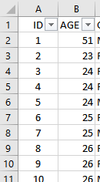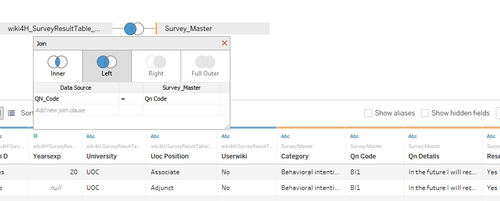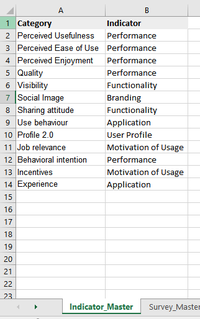Difference between revisions of "ISSS608 2016-17 T1 Assign2 Ong Han Ying - Data Preparation After Design Iteration"
| (2 intermediate revisions by the same user not shown) | |||
| Line 40: | Line 40: | ||
{|style= width="101%; margin-left: 0 auto ; margin-right: 0auto ; border: none " cellspacing="3" cellpadding="0" valign="top" border="0" | | {|style= width="101%; margin-left: 0 auto ; margin-right: 0auto ; border: none " cellspacing="3" cellpadding="0" valign="top" border="0" | | ||
| − | | style="font-family:Arial; font-size:100%; solid #000000;background:# | + | | style="font-family:Arial; font-size:100%; solid #000000;background:#F7F9F9; border-top:10px solid #FFFFFF; border-bottom:3px solid #A6ACAF; text-align:center;" width="50%" | |
; | ; | ||
[[ISSS608 2016-17 T1 Assign2 Ong Han Ying - Data Preparation|<font color="#0B5345"><big>Initial Preparation Work</big></font> ]] | [[ISSS608 2016-17 T1 Assign2 Ong Han Ying - Data Preparation|<font color="#0B5345"><big>Initial Preparation Work</big></font> ]] | ||
| − | | style="font-family:Arial; font-size:100%; solid #000000; background:#E8F6F3; border-bottom: | + | | style="font-family:Arial; font-size:100%; solid #000000; background:#E8F6F3; border-bottom:3px solid #7DCEA0; border-top:10px solid #FFFFFF; text-align:center;" width="50%" | |
; | ; | ||
[[ISSS608 2016-17 T1 Assign2 Ong Han Ying - Data Preparation_After_Design_Iteration|<font color="#0B5345"><big>'''After Design Iteration'''</big></font> ]] | [[ISSS608 2016-17 T1 Assign2 Ong Han Ying - Data Preparation_After_Design_Iteration|<font color="#0B5345"><big>'''After Design Iteration'''</big></font> ]] | ||
| Line 68: | Line 68: | ||
</font> | </font> | ||
| − | + | =5.5: Additional Data Identified from Design Iteration = | |
This section highlights the additional data preparation work that is identified in [[ISSS608 2016-17 T1 Assign2 Ong Han Ying - Approach|'''Section 6: Approach''']]. | This section highlights the additional data preparation work that is identified in [[ISSS608 2016-17 T1 Assign2 Ong Han Ying - Approach|'''Section 6: Approach''']]. | ||
| Line 74: | Line 74: | ||
This is aligned with the overview of data preparation in [[ISSS608 2016-17 T1 Assign2 Ong Han Ying - Data Preparation|'''Section 5.0: Overview''']] where additional data may be required at the visualization & analysis stage. | This is aligned with the overview of data preparation in [[ISSS608 2016-17 T1 Assign2 Ong Han Ying - Data Preparation|'''Section 5.0: Overview''']] where additional data may be required at the visualization & analysis stage. | ||
| − | + | ==5.5.1: Rephrasing the Survey Questions == | |
With reference to [[ISSS608 2016-17 T1 Assign2 Ong Han Ying - Approach_Data_Presentation|'''6.2.2: Analysing Categorical Data''']], the survey questions has been shortened, as below; | With reference to [[ISSS608 2016-17 T1 Assign2 Ong Han Ying - Approach_Data_Presentation|'''6.2.2: Analysing Categorical Data''']], the survey questions has been shortened, as below; | ||
| Line 80: | Line 80: | ||
[[File:OHY Qn Rephrase.jpg |1000px|centre|Rephrasing of Survey Questions]] | [[File:OHY Qn Rephrase.jpg |1000px|centre|Rephrasing of Survey Questions]] | ||
| − | + | ==5.5.2: Creating Manual Binning == | |
With reference to [[ISSS608 2016-17 T1 Assign2 Ong Han Ying - Approach Data Presentation|'''6.2.3: Analysing Interval Data''']], manual binning are created in the dataset (through MS EXCEL's formula), as below; | With reference to [[ISSS608 2016-17 T1 Assign2 Ong Han Ying - Approach Data Presentation|'''6.2.3: Analysing Interval Data''']], manual binning are created in the dataset (through MS EXCEL's formula), as below; | ||
| Line 95: | Line 95: | ||
|} | |} | ||
| − | + | ==5.5.3: Adding #ID to the Survey Result's Dataset== | |
From [[ISSS608 2016-17 T1 Assign2 Ong Han Ying - Approach Data Presentation|'''6.2.4: Computing Survey Results - Using Frequency Tables''']], it was identified that #ID has to be added to the dataset. As such, #ID is added to the excel file, and "wiki4H_SurveyResultTable_Final_V2.xlsx" is created, to support the analysis. The implementation steps as display below; | From [[ISSS608 2016-17 T1 Assign2 Ong Han Ying - Approach Data Presentation|'''6.2.4: Computing Survey Results - Using Frequency Tables''']], it was identified that #ID has to be added to the dataset. As such, #ID is added to the excel file, and "wiki4H_SurveyResultTable_Final_V2.xlsx" is created, to support the analysis. The implementation steps as display below; | ||
| Line 107: | Line 107: | ||
[[File:OHY_Data_Prep_11.png |600px|centre|Pivoting in Tableau]] | [[File:OHY_Data_Prep_11.png |600px|centre|Pivoting in Tableau]] | ||
| − | + | ==5.5.4: Joining Survey Results' Table and Survey Master's Table== | |
From [[ISSS608 2016-17 T1 Assign2 Ong Han Ying - Approach Data Presentation|'''6.2.4: Computing Survey Results - Using Frequency Tables''']], it was also identified that the 2 tables of "Survey Results", and "Survey Master" has to be joined, so to support the analysis. The implementation steps as completed in tableau, and as display below; | From [[ISSS608 2016-17 T1 Assign2 Ong Han Ying - Approach Data Presentation|'''6.2.4: Computing Survey Results - Using Frequency Tables''']], it was also identified that the 2 tables of "Survey Results", and "Survey Master" has to be joined, so to support the analysis. The implementation steps as completed in tableau, and as display below; | ||
| Line 113: | Line 113: | ||
[[File:OHY_Data_Prep_12.png |500px|centre|Joining the Tables in Tableau ]] | [[File:OHY_Data_Prep_12.png |500px|centre|Joining the Tables in Tableau ]] | ||
| − | + | ==5.5.5: Creating an "Indicator_Master" and Joining the Tables== | |
From [[ISSS608 2016-17 T1 Assign2 Ong Han Ying - Approach Data Presentation|'''6.2.4: Computing Survey Results - Using Frequency Tables''']], it was identified that the a new table of "Indicator_Master" has to be created, and then, to be joined to the Master Dataset, so to support the analysis. The implementation steps as completed in tableau, and as display below; | From [[ISSS608 2016-17 T1 Assign2 Ong Han Ying - Approach Data Presentation|'''6.2.4: Computing Survey Results - Using Frequency Tables''']], it was identified that the a new table of "Indicator_Master" has to be created, and then, to be joined to the Master Dataset, so to support the analysis. The implementation steps as completed in tableau, and as display below; | ||
| Line 123: | Line 123: | ||
[[File:OHY_Data_Prep_14.png |500px|centre|Joining the Tables in Tableau]] | [[File:OHY_Data_Prep_14.png |500px|centre|Joining the Tables in Tableau]] | ||
| − | + | ==5.5.6: Research Paper's Hypothesis == | |
From [[ISSS608 2016-17 T1 Assign2 Ong Han Ying - Approach Inital Layout|'''6.1.2: Objective 2 - To Identify Further Insights to the Conclusion of the Research Paper''']], it was identified that the summary of the hypothesis from the research paper is not available. As such, a new table of "Hypothese" is created in the excel database of "Survey_QN_Master" to support the analysis. The summary of the table as below; | From [[ISSS608 2016-17 T1 Assign2 Ong Han Ying - Approach Inital Layout|'''6.1.2: Objective 2 - To Identify Further Insights to the Conclusion of the Research Paper''']], it was identified that the summary of the hypothesis from the research paper is not available. As such, a new table of "Hypothese" is created in the excel database of "Survey_QN_Master" to support the analysis. The summary of the table as below; | ||
Latest revision as of 12:03, 15 October 2016
|
|
|
|
|
|
|
|
|
|
|
5.5: Additional Data Identified from Design Iteration
This section highlights the additional data preparation work that is identified in Section 6: Approach.
This is aligned with the overview of data preparation in Section 5.0: Overview where additional data may be required at the visualization & analysis stage.
5.5.1: Rephrasing the Survey Questions
With reference to 6.2.2: Analysing Categorical Data, the survey questions has been shortened, as below;
5.5.2: Creating Manual Binning
With reference to 6.2.3: Analysing Interval Data, manual binning are created in the dataset (through MS EXCEL's formula), as below;
| Field Name | Formula | Output |
|---|---|---|
| AGE_Manual_Bin_1 | =IF([AGE]="","",IF([AGE]<=30,"<=30",IF([AGE]<=40,"31-40",IF([AGE]<=50,"41-50",IF([AGE]<=60,"51-60",">60"))))) | "<=30", "31-40", "41-50", "51-60", ">60" |
| AGE_Manual_Bin_2 | =IF([AGE]="","",IF([AGE]<=30,"21-30",IF([AGE]<=40,"31-40",IF([AGE]<=50,"41-50",IF([AGE]<=60,"51-60","61-70"))))) | "21-30", "31-40", "41-50", "51-60", "61-70" |
| YEARSEXP_Manual_binning_2 | =IF([YEAREXP]="","",IF([YEAREXP]<=10,"0-10",IF([YEAREXP]<=20,"11-20",IF([YEAREXP]<=30,"21-30",IF([YEAREXP]<=40,"31-40","41-50"))))) | "0-10", "11-20","21-30","31-40", "41-50" |
5.5.3: Adding #ID to the Survey Result's Dataset
From 6.2.4: Computing Survey Results - Using Frequency Tables, it was identified that #ID has to be added to the dataset. As such, #ID is added to the excel file, and "wiki4H_SurveyResultTable_Final_V2.xlsx" is created, to support the analysis. The implementation steps as display below;
Step1 : Assigning Unique #ID into the dataset,
Step2 : Load the Dataset into Tableau, and do a "pivot", as below;
5.5.4: Joining Survey Results' Table and Survey Master's Table
From 6.2.4: Computing Survey Results - Using Frequency Tables, it was also identified that the 2 tables of "Survey Results", and "Survey Master" has to be joined, so to support the analysis. The implementation steps as completed in tableau, and as display below;
5.5.5: Creating an "Indicator_Master" and Joining the Tables
From 6.2.4: Computing Survey Results - Using Frequency Tables, it was identified that the a new table of "Indicator_Master" has to be created, and then, to be joined to the Master Dataset, so to support the analysis. The implementation steps as completed in tableau, and as display below;
Step 1: Creating a new worksheet of "Indicator_Master" in "Survey_Master.xlsx";
Step 2: Joining "Indicator_Master" table, to the master table, as below;
5.5.6: Research Paper's Hypothesis
From 6.1.2: Objective 2 - To Identify Further Insights to the Conclusion of the Research Paper, it was identified that the summary of the hypothesis from the research paper is not available. As such, a new table of "Hypothese" is created in the excel database of "Survey_QN_Master" to support the analysis. The summary of the table as below;
| Field Name | Description |
|---|---|
| Hypothesis Code | Hypothesis Code, such as H1 etc |
| Description | Description of the Hypothesis |
| Qn_Code | Question Code |
Next, this table is joined to the other table, as below;
Previous Sub-section: Initial Preparation Work







